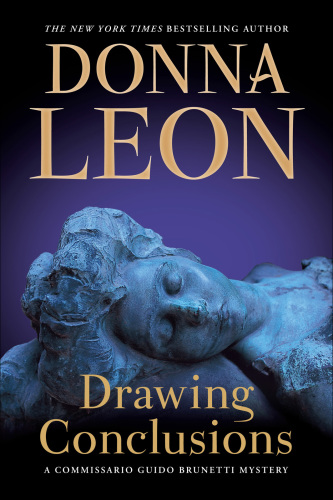
Drawing Conclusions
A Commissario Guido Brunetti Mystery, Book 20
کتاب های مرتبط
- اطلاعات
- نقد و بررسی
- دیدگاه کاربران
نقد و بررسی

February 14, 2011
Leon's fine 20th Commisario Guido Brunetti mystery (after 2010's A Question of Belief) explores violence against women and the treatment of the elderly. The Venetian medical examiner has ruled that Costanza Altavilla, a widow in her 60s, died of a heart attack, but Brunetti has his doubts. The discovery of several changes of clothes in various sizes in the deceased's modest apartment and Brunetti's talks with the insightful Signorina Elettra reveal that Altavilla was running a safe house for women escaping domestic violence. Could one of the abusive men have confronted Altavilla and scared her to death? Brunetti's investigation takes him to an old-age home, where Altavilla volunteered, in search of answers. Leon provides a vivid view of Venice, balancing the city's "glory days" with the reality of "the flaking dandruff of sun-blasted paint peeling from shutters." Compassionate yet incorruptible, Brunetti knows that true justice doesn't always end in an arrest or a trial.

January 1, 2011
Perhaps the quietest of all Commissario Guido Brunetti's cases concerns a murder that may not even be a murder.
"She was a good neighbor," translator Anna Maria Giusti says of Costanza Altavilla, the ex-schoolteacher who lived downstairs until her fatal heart attack. There's some indication that Signora Altavilla may have been manhandled shortly before her death—in fact, the rough treatment may even have led to her death—but Vice-Questore Giuseppe Patta, with his usual genius for the wrong decision, wants Brunetti to sign off on the case out of deference to her son, Claudio Niccolini, the former veterinarian of Patta's own son. Naturally, Brunetti continues to make modest inquiries, and soon he's discovered two promising lines of inquiry. The retired widow sheltered abused women for an organization called Alba Libera, and Maria Sartori, one of the nursing-home patients she worked with, was once involved in a dodgy maneuver that left the entire estate of Marie Reynard, a wealthy patron of the arts, in the hands of the late Benevento Cucetti, the lawyer who drew up her will. Was Signora Altavilla menaced by the abusive boyfriend looking for her latest tenant, or was it someone out of Maria Sartori's past—if indeed she was menaced by anyone at all?
As languid in its movement as a gondola ride. Yet none of Brunetti's earlier cases (About Face, 2009, etc.) is as remorselessly clear in connecting the delicately comic anti-authoritarian gestures Brunetti winks at to the miasma of corruption that hangs over his beloved Venice.
(COPYRIGHT (2011) KIRKUS REVIEWS/NIELSEN BUSINESS MEDIA, INC. ALL RIGHTS RESERVED.)

November 1, 2010
Hard to believe--but let's be grateful--that Commissario Guido Brunetti is on his 20th case. Here, an old woman is found dead, and those bruises could have been sustained as she collapsed to the ground after a heart attack. But Brunetti is suspicious, especially when he hears about the old woman's "terrible honesty." Essential for mystery collections.
Copyright 2010 Library Journal, LLC Used with permission.

Starred review from February 15, 2011
Leons twentieth novel starring Venetian police commissario Guido Brunetti is one of her best. But why? Not because she breaks new ground, either in terms of the characters or the story. This tale of the murder of a retired teacher who was helping abused women escape their abusers offers a sensitive but never by-the-numbers exploration of a contemporary social problem, as do many of the other novels in the series, and it takes plenty of breaks between the crime-solving to portray fan favorite Brunetti the family man, interacting joyously with his wife and children. It also delivers a typically Leon-style ambiguous ending in which traditional justice is either less important than or even detrimental to Brunettis real concern: doing his best to set things right for the various troubled souls he encounters in the course of his investigation. So what makes the book stand out? Its simply this: Brunetti walks around Venice a lot in this novel, and when he walks, he muses. And when he muses, the reader listens almost hypnotically, transfixed by the somehow ennobling ordinariness of this remarkable mans humanity but also by the subtlety of his mind and his absolute refusal to succumb to the tyranny of bureaucrats and moralists. HIGH-DEMAND BACKSTORY: Leons popularity among mystery fans has grown steadily, but over the last several years, she has become a must-read for all those who favor character-driven crime stories. She is especially popular in libraries and among librarian mystery readers.(Reprinted with permission of Booklist, copyright 2011, American Library Association.)

























دیدگاه کاربران